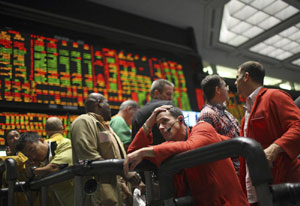|
Socialist Workers 2008 Campaign
Click here for campaign material
|
|
(lead article)
U.S. bank crisis shocks
world financial system
Stocks plunge, more failures to come

|
|
Reuters/John Gress
|
|
Traders in the S&P 500 pit at the Chicago Mercantile Exchange September 15 after major stocks plunge in response to investment bank Lehman Brothers filing for bankruptcy protection.
|
BY BRIAN WILLIAMS
The U.S. financial system was jolted in mid-September as Lehman Brothers, the fourth largest investment bank in the United States, filed for bankruptcy and Merrill Lynch, fearing a similar-type collapse, agreed to a $50 billion takeover by Bank of America.
The Dow Jones industrial average fell 4.4 percent September 15, the biggest decline in seven years, and another 4.1 percent two days later. The decline in stock prices worldwide September 15-17 has resulted in about $3.6 trillion in losses.
The stock of American International Group (AIG), once the world’s largest insurance company, has plunged more than 90 percent to $2.05. Last year company shares were as high as $72. The U.S. government took control of AIG with an $85 billion bailout September 16.
“The panic in world credit markets reached historic intensity on Wednesday [September 17] prompting a flight to safety of the kind not seen since the second world war,” reported the Financial Times September 17. “Lending between banks in Europe and the U.S. in effect halted” that day.
These developments point to the largest financial crisis facing the U.S. rulers since the opening of the Great Depression. They occur a week after the federal government seized control of Fannie Mae and Freddie Mac, the giant mortgage companies.
“In the past when you had a crisis that resulted in a big failure, that ended up being closer to the bottom than anything else, Liz Sonders, the chief investment strategist for Charles Schwab & Company told the New York Times. “The problem is that we have waves of these. Where does it stop is the question that is different than in the past.”
Lehman Brothers, the oldest major firm on Wall Street, had been in operation since before the Civil War, and Merrill Lynch for the past 94 years.
In 2006 Lehman was the top underwriter of subprime mortgage securities with an 11 percent market share, according to Inside Mortgage Finance. However, over the past year, with rising mortgage defaults and declining home prices, its stocks declined about 90 percent. In February 2007 the company’s stock market value was nearly $50 billion at $86.18 a share. As of September 12 of this year its stocks were worth $2.5 billion at $3.65 a share.
Lehman Brothers owes more than $600 billion to creditors across the United States as well as in Europe and Asia, according to the investment bank’s Chapter 11 filing. Citigroup and Bank of New York Mellon are owed about $138 billion in Lehman’s bond debt. Four banks in Japan are owed a total of about $1.26 billion. Financial institutions in South Korea are owed about $700 million, and BNP Paribas in France, $250 million.
Just prior to its collapse, Lehman attempted to divide the company’s debt into a “good” bank and a “bad” bank, the latter of which would contain about $85 billion in “souring assets,” reported the Wall Street Journal. The plan was to have other Wall Street firms inject some capital to keep the “bad” bank from sinking. Major bank executives rejected this approach.
Treasury Secretary Henry Paulson and Federal Reserve Chairman Ben Bernanke called a September 12-13 emergency meeting of executives of about 30 banks to make clear that there would be no direct federal bailout of Lehman. Federal officials pleaded with the bankers to take over or put up the funds to salvage Lehman, but to no avail.
The Federal Reserve, however, did make it easier for financial companies to obtain loans of up to $200 billion by furnishing any kind of investment-type papers, including junk bonds. A group of 10 major domestic and foreign banks said they would contribute $70 billion to an emergency borrowing facility to which failing financial firms can have access.
On September 15, the same day that Lehman filed for bankruptcy, Merrill Lynch was bought by Bank of America. Merrill Lynch, the world’s largest brokerage firm, had a paper value of more than $100 billion last year. Its stock shares have fallen nearly 70 percent this year.
Merrill had employed as many as 60,000 people. Lehman, about 25,000. Many of them will now be joining the ranks of the millions currently unemployed.
“Merrill Lynch is hardly the only troubled financial institution on the horizon,” stated a September 15 New York Times article. “Administration officials acknowledged last week that more bank failures were inevitable, and the main protection for depositors—the Federal Deposit Insurance Corporation—is likely to exhaust its reserves.”
AIG put hundreds of billions of funds in derivatives and hedge fund transactions, reported the Financial Times. New York governor David Paterson announced September 15 that AIG could borrow $20 billion from the state to help keep itself afloat.
Related articles:
Labor and the capitalist crisis
| 


